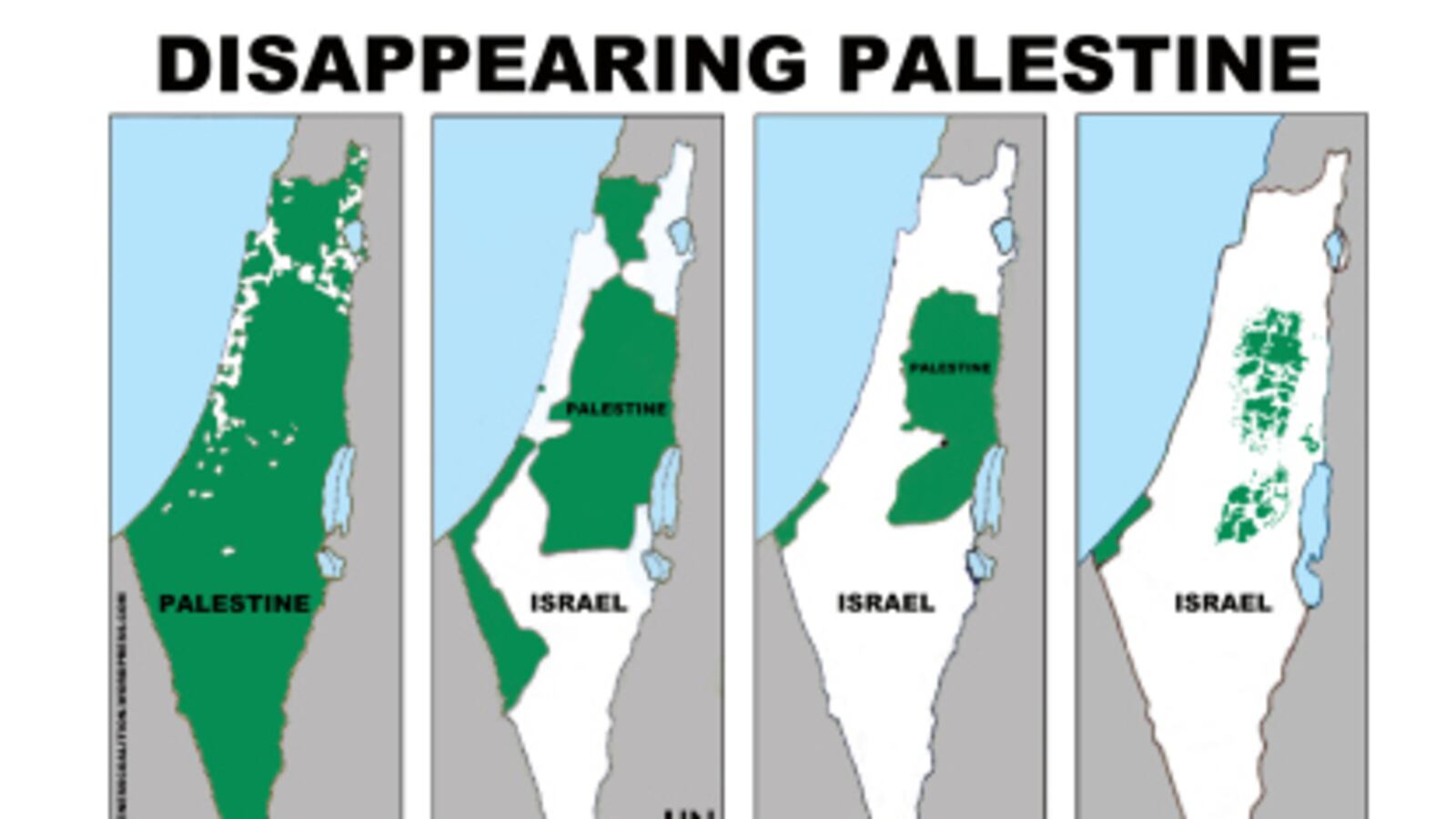A new ad campaign on public transit in Vancouver has created a conflict triangle among Palestine-issue activists, the organized Jewish community, and Vancouver’s transit authority. The ad depicts four maps of Israel/Palestine accompanied by the text “Disappearing Palestine: 5 million Palestinians are classified as refugees by the U.N.” The four maps, visible here, start in 1946 and conclude in 2012, and illustrate the changing balance of Israeli-Palestinian control before Israel’s founding, under the 1947 U.N. Partition Plan, in 1967, and today.

In a press release issued by the Palestine Awareness Coalition, Martha Roth of Independent Jewish Voices explains that the ads are intended to “make the Canadian public aware of Israel’s steady absorption of Palestinian territory from 1946 to the present day and the constant oppression that accompanies that occupation.”
In response, the Jewish Federation of Greater Vancouver and the Centre for Israel and Jewish Affairs (CIJA), Pacific Region, have issued their own press release, documenting the actions they have taken—so far unsuccessfully—to block the ads. They state that “...these ads violate TransLink’s own policies, which hold that Vancouver’s public transportation system must be a safe and welcoming environment for all racial, ethnic, religious and minority groups. The transit authority policy publicly states that, ‘No advertisement will be accepted which TransLink...considers to be of questionable taste or in any way offensive in the style, content or method of presentation.’”
Many readers will recall the controversy that erupted over the anti-Muslim ads that ran last year in New York City subway stations. The ads were widely condemned, including by the American Jewish Committee and the Anti-Defamation League. Rabbis for Human Rights—North America (now Truah) even responded with their own ads urging residents to “help stop bigotry against our Muslim neighbors.”
As in Vancouver, the principle of free speech is what won the day in New York. But the broader question for our purposes is whether this is, as Jewish Federation and CIJA argue, a case of “the offensive and potentially dangerous targeting of a minority group”? Or is it simply one statement in a legitimate political debate about an ongoing territorial dispute?
Certainly, the campaign’s primary message is that there has been a grave injustice done to Palestinian refugees and those who remain in the occupied West Bank. Some Jews are no doubt threatened by any mention of the Nakba and the Palestinian historical experience of dispossession around Israel’s founding. Yet history—in all its messy outlines—is silenced at civilization’s peril.
But the bigger question is whether the posters are suggesting that Israel be eradicated. In my reading, the ad is explicitly conveying two messages: that territorial control in the area of Israel/Palestine has shifted radically in favor of Israel over the last six decades, and that there is an outstanding refugee problem that needs to be addressed.
What the ad doesn’t mention, of course, is the right of Israel to exist. There is no doubt that within the dominant Diaspora Jewish narrative, the existence of Israel is a totem of identity, and much of so-called “pro-Palestinian” activism is viewed through the lens of denying Jews the right to a sovereign state. This ad campaign says little about the legitimacy of Israel’s existence, even in a pared-back territorial context. But it’s quite clear from the platform of the “boycott Israel” movement that a two-state solution is not the preferred one.
Were Israel to retreat from the West Bank, as liberal Zionists demand, and were the refugee problem to be solved in a mutually agreed-upon way, would these advertisers cease their formal and informal campaigns? Given the BDS (boycott, divestment and sanctions) platform, probably not. Upon visiting the Palestine Awareness Coalition website, the intended meaning becomes even clearer; they all but condemn Israel’s existence, calling the “65 year-long Israeli occupation of Palestine an international outrage.”
Is calling for the eradication of Israel—subtly or overtly—potentially injurious? Could minority groups—in this case, Jews—feel less safe on the streets of Vancouver if the founding of the State of Israel were viewed to be an historical injustice? Sadly for Zionists, this is probably going to be an act of history on which reasonable people will continue to disagree, even more so as anti-colonialist thinkers—for all the decent arguments against Israel being an example of a colonialist state—will increasingly place Israel, along with its interwar European backers, in that camp. Given the very real cost inflicted on the Palestinian people by Israel’s founding, pairing Israel with the idea of injustice is a view with which Jews can disagree, but not necessarily one about which they can cry the foul of offensive and targeting speech.
But there is something the Jewish community can do. Rather than silence the call for the clock of history to be rolled back to 1948, a call that is both futile and arrogant in its lack of empathy for one side of the conflict, the Jewish community should jump into the marketplace of ideas and issue a call for a mutually just solution, one that respects the needs and desires of both sides, today, in 2013. With much of organized Jewish discourse having evolved to defend Israel through hasbarah and related tactics, this is something that is not heard often enough.






